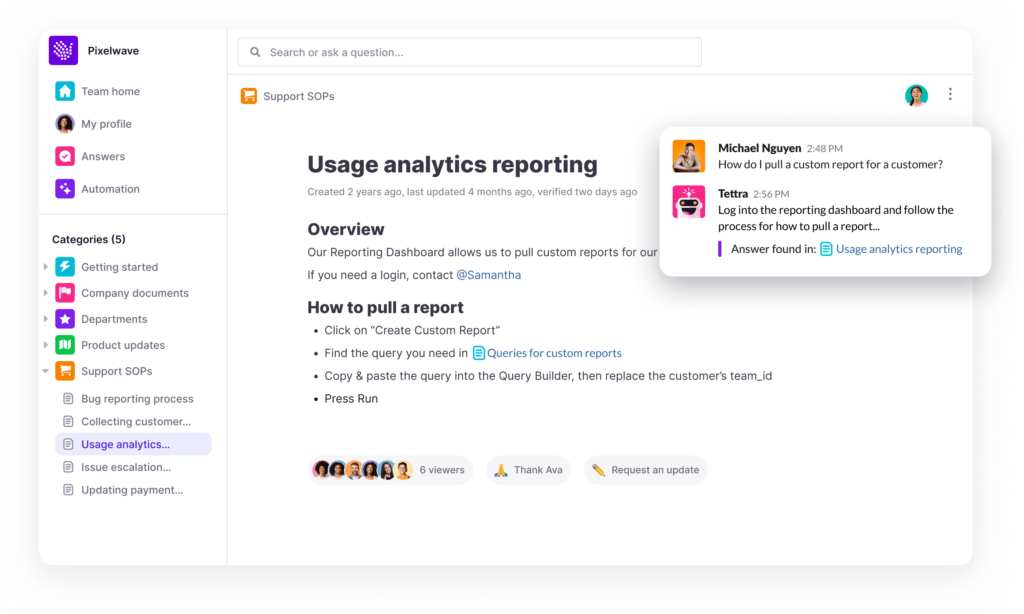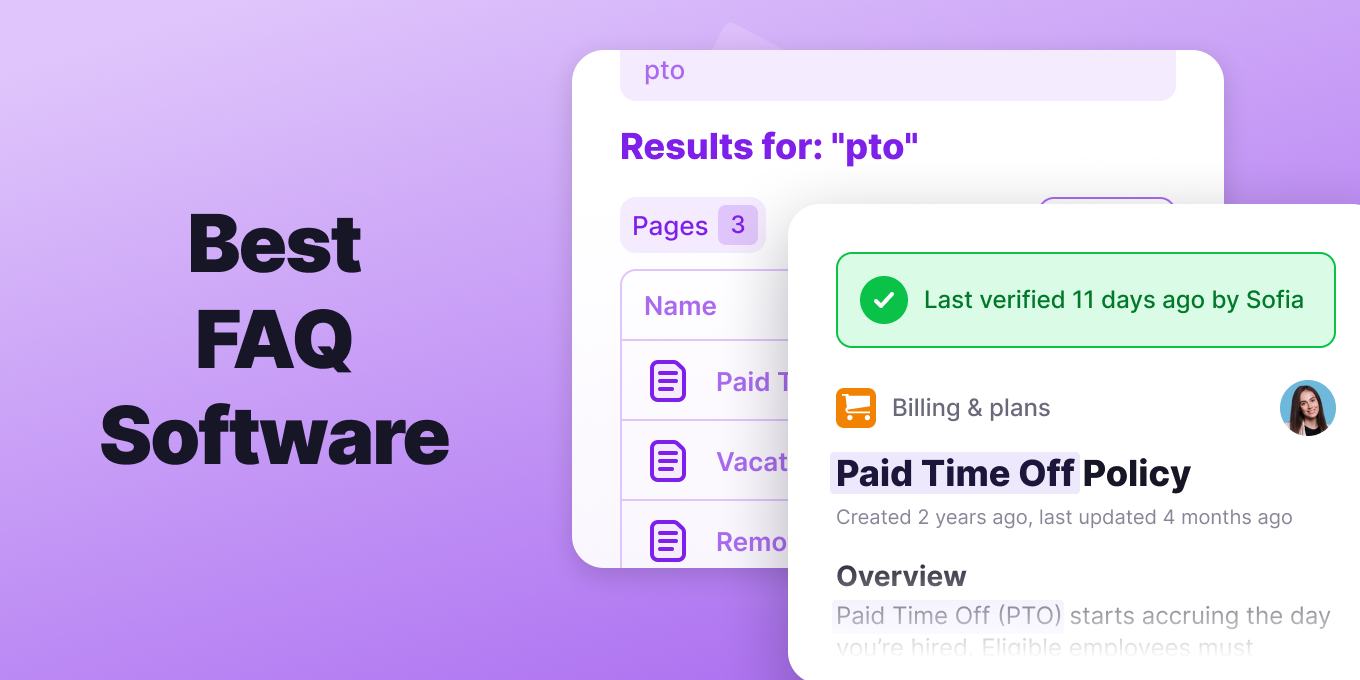FAQ software simplifies information delivery by providing a central platform where users can find answers to commonly asked questions.
This specialized software is designed to automate and manage the frequently asked questions portion of a website or service, allowing customers to find answers quickly without human intervention.
How is FAQ software used?
FAQ software is typically used to address repetitive inquiries. It improves the experience by providing instant answers and reduces the workload on customer service teams. Businesses like retail, technology, and services, use FAQ software to enhance their support operations.
Any business aiming to enhance customer service efficiency and reduce support costs can benefit from integrating FAQ software. It’s particularly valuable for companies with high customer interactions and those looking to scale their support operations efficiently.
Why is FAQ software important for customer service?
Having immediate answers in FAQ software is crucial in customer service because it offers immediate responses to common queries, especially around product informaton. This instant support increases customer satisfaction and can significantly impact retention by providing a dependable support experience.
The impact on customer satisfaction and retention
By enabling customers to solve problems independently, FAQ software boosts satisfaction and fosters a sense of empowerment among users. This self-service capability with FAQ content is essential where quick and convenient solutions are highly valued.
Integrating FAQ software into a broader customer support strategy helps streamline service processes. It acts as a first line of defense in customer support, filtering out routine queries and allowing support teams to focus on more complex issues, improving overall service quality and efficiency.
What are the benefits of FAQ software?
1. Improved customer experience
- Provides quick and easy access to information, reducing the frustration of long wait times.
- Enhances satisfaction by delivering prompt answers to customer queries.
2. Reduced workload on customer service teams
- Automates responses to repetitive queries, allowing each support agent to focus on resolving more complex issues.
- Improves efficiency and productivity by minimizing the volume of basic inquiry tickets.
3. Increased customer satisfaction
- Ensures consistent and accurate information is available, which helps build trust and loyalty.
- Offers customers the convenience of self-service, leading to a more satisfying user experience.
4. Save money & be more efficient
- Streamlines support processes, reducing the need for extensive customer service staffing.
- Offers a scalable solution that grows with the business, providing long-term cost benefits.
Key features for FAQ software
Search Functionality and Advanced Search Capabilities
- Advanced search options, such as filters and keyword recognition, are crucial for helping users quickly find the information they need.
- A powerful search engine can significantly enhance the usability of FAQ software, making it easier for customers to navigate and locate answers.
- For instance, Tettra has an integrated search for titles once they are linked inside of Tettra and the AI assistant takes search up another level when looking for info
User-Friendly Interface and Intuitive Navigation
- The effectiveness of FAQ software largely depends on its ease of use; a user-friendly interface ensures that customers can find answers without any hassle.
- Intuitive navigation aids in better user engagement and reduces the learning curve associated with new software.
What is the best FAQ software?
1. Tettra
Tettra is a knowledge management tool designed to help teams efficiently organize and access shared knowledge within tools they already use, like Slack.
It promotes better collaboration by allowing team members to contribute to and maintain a centralized information hub, ensuring everyone can access the latest procedures, guidelines, and insights.
It especially works well for customer service teams and those focused on company documentation.
- Overview of Features:
- AI assistant to find instant answers from your docs & company info
- Assists with auto-tagging content for improved search, generating FAQs from existing info, and identifying knowledge gaps
- Content verification so every page is curated & up-to-date
- Robust search capabilities integrated with Slack
- Content suggestions and requests to fill knowledge gaps
- Pros:
- Enhances team productivity with integrated workflows
- Reduces repeated questions with a searchable knowledge base
- Easy content creation and management
- Cons:
- Requires regular content updates to stay relevant
- Limited external-facing FAQ capabilities
- Initial setup and ongoing management can be time-consuming
- Ideal Users:
- Customer service teams using Slack
- Organizations that prioritize internal knowledge sharing
- Companies looking for a scalable knowledge management solution
What users say about Tettra:
“It’s a self-explanatory, easy-to-use tool that we use daily. We love that all our tech stack information can be held in this one central repository, which is self-explanatory and easy to navigate. All our developers, project managers, and senior managers use this daily to be able to understand how our systems work and make them better.” – G2
2. HappyFox
HappyFox provides a solid suite of customer support tools, including an FAQ management system, which makes it easy for businesses to streamline their support operations. This platform features a powerful ticketing system, a self-service knowledge base, and automation to enhance customer service efficiency.
- Overview of Features:
- Integrated ticketing system with multichannel support
- Promote Self-help. Build an online knowledge base that puts your customers in the driving seat.
- Support your customers faster with intelligent help desk automation. Automate repetitive tasks using smart help desk workflows.
- Pros:
- Offers comprehensive customer support tools
- Supports extensive customization to fit various workflows
- Robust reporting and analytics capabilities
- Cons:
- Can be expensive for small businesses
- Complex setup and customization processes
- Potentially overwhelming for very small teams
- Ideal Users:
- Medium to large enterprises
- Businesses needing extensive support automation
- Organizations with a need for detailed performance analytics
What users say about HappyFox:
“I love HappyFox because it is a robust, user-friendly ticketing system that you can set up within 24 hours and go live with little to no training. I have worked in other ticketing systems, such as ZenDesk and ZohoDesk, as well as Salesforce Cases and HappyFox is much easier to work in and to customize.” – G2
3. SupportBee
SupportBee is geared towards providing an intuitive ticketing system that mimics the simplicity of email combined with the power of a helpdesk. It’s designed for teams that want a straightforward approach to handling customer support without the complex features that often clutter other helpdesk solutions.
- Overview of Features:
- Their shared inbox works just like email.
- SupportBee’s integrated knowledge base software empowers your customers to help themselves by finding answers to their questions without having to write to customer support.
- SupportBee’s Customer portal software provides a web portal for your customers to send, manage and track the progress of their support requests.
- Pros:
- Extremely user-friendly and easy to adopt
- Affordable pricing structure
- Efficiently handles support tickets without unnecessary features
- Cons:
- Limited advanced customization options
- May not scale well for very large organizations
- Lacks some of the deeper integrations and features of more comprehensive platforms
- Ideal Users:
- Small businesses and startups
- Teams looking for a simple, email-like ticketing system
- Organizations that prefer a straightforward, no-frills support tool
What users say about SupportBee:
“Does a few things very well. Lightweight support solution, lightweight knowledge base that can be deployed to a custom URL. Ability to set organizational access (everyone in a group can access each other’s tickets, etc), and assign tickets to various members of our support staff.” – G2
4. Zendesk Guide
Zendesk Guide is part of the Zendesk family of products, offering a powerful knowledge management and self-service solution that helps businesses create, organize, and share content to empower customers and agents.
- Overview of Features:
- Product guides help to make the most of your Zendesk setup with our comprehensive documentation.
- Content management system to organize and update FAQs and articles
- Use video to watch and learn how to use Zendesk
- Pros:
- Seamlessly integrates with Zendesk Support
- Enhances customer self-service with a comprehensive knowledge base
- Facilitates community interaction and customer engagement
- Cons:
- Can be costly, especially for smaller businesses
- Requires some training to utilize all features fully
- May involve a complex setup depending on the scale
- Ideal Users:
- Medium to large businesses with a high volume of customer interactions
- Companies that require a tightly integrated customer service suite
- Organizations that value customer-driven content and community-building
What users say about Zendesk Guide:
“I like how Zendesk positions itself as the leader in support systems through angaging its community, purchasing key companies to aggregate value to their offerings and features (such as Ultimate for Ai features, including an AI bot, and Klaus for QA).” – G2
5. Freshworks Customer Service Suite
Freshworks Customer Service Suite, featuring Freshdesk, is designed to provide businesses with comprehensive tools to effectively manage customer interactions across various channels
- Overview of Features:
- Omnichannel support, including chat, email, phone, and social media
- Freddy AI helps customers, agents, admins, and leaders do more with less time and effort.
- Intelligent insights and analytics help to stay ahead of emerging issues with proactive, AI-driven insights and next steps.
- Pros:
- Streamlines customer interactions across multiple platforms
- Offers robust automation to increase operational efficiency
- Provides detailed insights into customer and team metrics
- Cons:
- Advanced features require more expensive plans
- Can have a steep learning curve for new users
- Customization options may require technical expertise
- Ideal Users:
- Growing businesses needing scalable customer service solutions
- Companies with a presence across multiple customer interaction channels
- Customer support teams that rely on data-driven strategies for improvement
What users say about Freshworks & Freshdesk:
“Freshdesk has delivered a tremendous amount of functionality and features with a small price tag. Features such as canned responses or the AI powered “thank you detector” allow support agents to focus on solving customer problems rather than spending time doing administrative work.” – G2
6. Document360
Document360 is a knowledge-base platform that helps you create rich self-service content. It is especially geared towards technical documentation and offers features to manage knowledge-base portals effectively.
- Overview of Features:
- Analytics gives rich insights to understand end-user engagement with your knowledge base and make data-driven decisions.
- All-in-One Dashboard is your gateway to seamless documentation insights.
- SEO features to ensure content is easily discoverable
- Pros:
- Provides a clean and intuitive user interface
- Supports documentation in multiple languages
- Advanced analytics to track user engagement and identify knowledge gaps
- Cons:
- Setup can be complex due to the multitude of features
- Higher cost in comparison to simpler FAQ platforms
- Maybe over-engineered for smaller teams with basic needs
- Ideal Users:
- Tech companies need detailed documentation
- Organizations requiring multi-language support
- Businesses looking for a robust SEO-ready documentation tool
What users say about Document360:
“Document360 is easy to use and enables us to write new articles quickly. The site allows our customers to find the documenation they are looking for and leave feedback on articles. We have found the ‘eddy’ search bar very useful when trying to find the right information.” – G2
7. Slab
Slab is a modern knowledge management system that helps teams stay aligned and informed with a unified workspace for documentation. It is designed to improve team learning and information sharing.
- Overview of Features:
- Unified team workspace to spread knowledge consistently throughout your company as you scale.
- Security is baked right into our product and regular development processes
- Integrations with popular tools like Slack, GitHub, and Asana
- Pros:
- A highly collaborative interface enhances team cohesion
- Powerful search capabilities for quick information retrieval
- Continuous sync with other tools maintains the information flow
- Cons:
- May require ongoing management to stay organized
- Pricing may escalate with additional integrations and user growth
- Might offer more features than are necessary for very small teams
- Ideal Users:
- Teams that rely on collaboration and integrations with other tools
- Companies seeking a powerful central repository for all types of documents
- Businesses needing a scalable solution for growing documentation needs
What users say about Slab:
“I love that all the docs are automatically formatted the same so that you do not have to go in and select from a million different fonts. They made the platform very simple and easy to use.” – G2
8. Helpjuice
Helpjuice specializes in knowledge management and FAQ software solutions, offering customization and powerful search capabilities to improve customer support and internal knowledge sharing.
- Overview of Features:
- Easy and unlimited text formating, uploading and manipulating with images, videos and many more.
- Powerful analytics to track usage and effectiveness
- Advanced search technology to quickly find relevant answers
- Pros:
- Excellent customization capabilities for unique brand alignment
- Strong support for large content databases
- In-depth analytics help measure and enhance user engagement
- Cons:
- Can be more expensive than other solutions, especially for premium features
- Initial setup and customization may require more time and resources
- Focus on large knowledge bases may be overwhelming for smaller teams
- Ideal Users:
- Mid to large-sized enterprises with extensive FAQ needs
- Companies that prioritize brand consistency across all platforms
- Organizations that value detailed analytics in their support tools
What users say about Helpjuice:
“I loved being able to import my knowledge base articles from Zendesk without any issues. It’s very easy to categorize, expire, and expose content to specific groups or indvidiuals with Helpjuice.” – G2
9. KnowledgeOwl
KnowledgeOwl offers a comprehensive FAQ and knowledge-based solution that makes it easy to create, manage, and share information internally and with customers.
- Overview of Features:
- Customizable knowledge base to fit specific organizational needs
- Show different content to different people with reader groups
- Give your readers a Google-style search that works out of the box. No setup required.
- Pros:
- Focuses on ease of use with a simple, intuitive interface
- Robust customization options allow for a tailored user experience
- Strong search capabilities ensure users find the information they need quickly
- Cons:
- Smaller user community may lead to fewer third-party resources
- Pricing may be prohibitive for startups or small teams
- Limited integrations compared to competitors
- Ideal Users:
- Companies looking for a highly customizable FAQ solution
- Businesses needing a strong SEO foundation for their knowledge base
- Teams requiring detailed reports on content usage and effectiveness
What users say about Knowledge Owl:
“We were switching from an in-house knowledge base and looked at everything from a wiki-style system to doing everything in-house again. When I found KnowledgeOwl and set up a demo account, everything felt different from the start.” – G2
How to Choose the Right FAQ Software: 10 Key Points
- Ease of Use: Ensure the software is user-friendly for quick adoption with minimal training.
- Low Initial Cost: Look for solutions that fit within limited budgets, ideal for small businesses and startups.
- Scalability: Choose software that can grow with your business, avoiding the need for platform changes.
- Cost-Effective Solutions: Consider options that offer scalable features from basic to full-service suites.
- Transparent Pricing: Understand pricing models (subscription-based or one-time fee) and analyze costs, including setup fees and additional services.
- Integration Capabilities: Ensure compatibility with existing tools like Slack and analytics software for a seamless workflow.
- Customization Options: Select software that allows customization of themes, colors, and logos to match your brand.
- Branding: Use branded FAQ pages to enhance customer trust and maintain a professional appearance.
- User Feedback: Incorporate user feedback for continuous improvement and consider reviews from reliable sources.
- Growth Potential: Opt for solutions that offer robust scalability options for expanding businesses.
By carefully considering these aspects, businesses can choose the right FAQ software to meet their current needs and support future growth and evolution.
More helpful info from Tettra:
- 9 best internal Q&A software (compare & review)
- Why do customer service & support teams need a knowledge base?
- 12 best AI customer service software to try
Why Tettra Is the best FAQ software & internal knowledge base
Everything is getting lost in Google Drive and Slack.
Other tools are too clunky and complicated for your customer service team to use. What to do when you need a single source of truth about what the real answer is?
That’s where Tettra comes in.
It’s one of the most intuitive internal knowledge bases with a UI everyone can track with.
Tettra has a streamlined interface that is beginner-friendly. It has a question and answers feature, as well as content verification which keeps knowledge base content up-to-date.

Tettra integrates with Slack which allows you to find answers directly in Slack even when it’s stored in Tettra.
No more pinging random channels or waiting on a response from the team leads — you can find it via the Tettra Slack app.
Tettra offers a full suite of tools for sharing knowledge.
With a Tettra internal knowledge base, you’ll get:
- AI-assistant for instant answers from your knowledge base, saving time and ending repetitive questions
- Q&A workflow to capture questions
- Knowledge base to document answers
- Knowledge management features to keep content up to date.
- Integrations with chat tools to make sure your team actually uses Tettra
Tettra works best as:
- Internal knowledge base for customer support, success, and service teams
- Documentation for operations and growing companies


